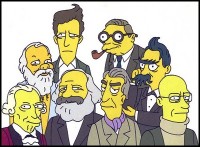Sunday, April 27, 2008, 03:00 PM
The Atlanta Journal-Constitution
Slowly but surely, you and your television are making your way back to the 18th century and those glorious, early days of the Republic, when wigs sat upon Whigs and political campaigns were little more than scorched-earth libel competitions.
Anyone with cable TV — virtually everyone, in other words — has sensed this for some time. Now someone’s come up with the numbers that show just how real the movement is.
Barry Hollander is an associate professor of journalism professor at the University of Georgia. He’s good at crunching numbers.
Hollander recently took five national surveys, conducted from 1998 to 2006 by the Pew Center for the People and the Press, and mushed them together to create an eight-year look at America’s political viewing habits.
What he documented was a quiet stampede.
In 1998, 27 percent of Republicans and 25 percent of Democrats tuned in regularly to Atlanta-based CNN. Eight years later, the number of Democrats had risen to 29 percent.
But the number of Republicans who tuned in to CNN had shrunk to 19 percent. Gosh, where do you think they went?
Over the same period, Fox News’ share of Republican viewers jumped from 14 to 36 percent.
Hollander documented a media shift among Democrats to friendly sources, too, but the most dramatic change has occurred among Republicans. And, possibly, among more casual consumers of news.
“Republicans have dramatically dropped news sources that they perceive as being biased against their position. They’ve completely fled into Fox and have left CNN, broadcast news and all the others,” Hollander said.
Outrage over alleged liberalism could explain this, except for one inconvenient fact. Republicans, Hollander said, have even dropped C-SPAN, which — because of its verbatim approach — is widely considered neutral in content.
Something larger is happening, the University of Georgia professor asserts. “People have always hung out with people like themselves,” Hollander said. The water-cooler world that most people live in is a huge echo chamber of attitudes and ideas.
“It was always thought that the media was the savior in this,” Hollander said.
In days gone by, before the Internet and before Ted Turner, three broadcast networks captured the attention of 90 percent of Americans. Our favorite uncle, CBS’ Walter Cronkite, spoke to us as a single group, sometimes telling some of us what we didn’t want to know.
Big Media would intrude and interrupt — like the high school cafeteria lady who heaped on the Brussels sprouts, whether they were wanted or not.
But no more. Cable TV and the Internet have set a world of choices before us, which permit us to avoid the unfamiliar, uncomfortable or objectionable. Facebook and MySpace allow us to build ever-larger empires of like-minded friends. On-line newspapers encourage you to customize the news that appears on your computer.
And no one is in the mood for Brussels sprouts.
Hollander said many of those not into politics — who once were forced to include some debate in their diet — have dropped news outlets altogether, preferring a world of 24-hour make-believe and entertainment.
Those most interested in political news, nearly all partisans by definition, are slowly gathering behind red and blue networks.
“I have no doubt that Fox and CNN know what’s going on, and are playing to it,” Hollander said. They’re marketing data is better than his, and more up-to-date — but they’re not sharing.
The media migration that Hollander documented explains CNN’s current resurgence against Fox. The Atlanta-based network has invested heavily in its coverage of the never-ending, Democratic soap opera that pits Hillary Clinton against Barack Obama.
“If [Republican John] McCain were still battling [Mitt] Romney, you would see Fox going up,” Hollander said.
But Hollander offers little hope for the future. “We’re slowly inching our way back to a partisan press,” he said.
We’ve been there before. Newspapers in the late 1700s and early 1800s were largely party mouthpieces that supplied the talking points of the day. Even the much-worshipped George Washington was damned as a traitor — by an outlet controlled by the equally venerated Tom Jefferson.
The penny press destroyed the party press, by proving that there was profit in a newspaper that could talk to everyone at once.
But history has a circular sense of humor, and now it’s the broadly appealing media — newspapers, radio, news magazines and broadcast TV — whose bottom lines are hurting.
Niche is the profitable future.










